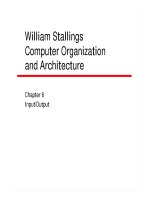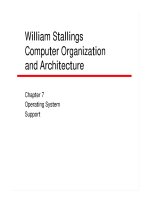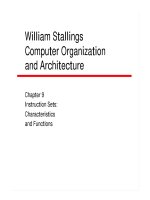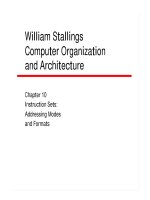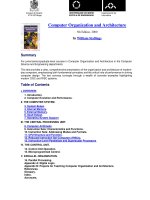Tài liệu William Stallings Computer Organization and Architecture P2 pptx
Bạn đang xem bản rút gọn của tài liệu. Xem và tải ngay bản đầy đủ của tài liệu tại đây (724.35 KB, 41 trang )
William Stallings
Computer Organization
and Architecture
Chapter 7
Operating System
Support
Objectives and Functions
§ Convenience
• Making the computer easier to use
§ Efficiency
• Allowing better use of computer resources
Layers and Views of a
Computer System
Operating System Services
§ Program creation
§ Program execution
§ Access to I/O devices
§ Controlled access to files
§ System access
§ Error detection and response
§ Accounting
O/S as a Resource Manager
Types of Operating System
§ Interactive
§ Batch
§ Single program (Uni-programming)
§ Multi-programming (Multi-tasking)
Early Systems
§ Late 1940s to mid 1950s
§ No Operating System
§ Programs interact directly with hardware
§ Two main problems:
• Scheduling
• Setup time
Simple Batch Systems
§ Resident Monitor program
§ Users submit jobs to operator
§ Operator batches jobs
§ Monitor controls sequence of events to process batch
§ When one job is finished, control returns to Monitor which reads
next job
§ Monitor handles scheduling
Job Control Language
§ Instructions to Monitor
§ Usually denoted by $
§ e.g.
• $JOB
• $FTN
• ... Some Fortran instructions
• $LOAD
• $RUN
• ... Some data
• $END
Desirable Hardware Features
§ Memory protection
• To protect the Monitor
§ Timer
• To prevent a job monopolizing the system
§ Privileged instructions
• Only executed by Monitor
• e.g. I/O
§ Interrupts
• Allows for relinquishing and regaining control
Multi-programmed Batch
Systems
§ I/O devices very slow
§ When one program is waiting for I/O, another can use the CPU
Single Program
Multi-Programming with
Two Programs
Multi-Programming with
Three Programs
Time Sharing Systems
§ Allow users to interact directly with the computer
• i.e. Interactive
§ Multi-programming allows a number of users to interact with the
computer
Scheduling
§ Key to multi-programming
§ Long term
§ Medium term
§ Short term
§ I/O
